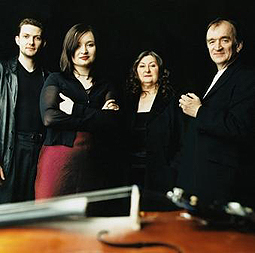Search
Rychard Carrington reports on Waterson Carthy – Barfly, Cambridge 4 March 2008
Wed, 05/03/2008 - 15:02 — Anonymous

Review of:
Waterson Carthy
Far too many folk music reviews these days celebrate that which isn't folk in the performance under discussion. If it mixes with other styles, if it includes contemporary songs, that's hip. If a folk band includes a cover of a pop hit in their repertoire then that one number usually receives more attention than all of their other numbers put together. There's at least a hint of a subtext that we don't really like acoustic traditional folk, but we can live with it if it's sufficiently adulterated.
Well bugger that. I think folk music is just brilliant. It's the voice of the people of the past, the ordinary, unprivileged people in particular: their honest, heartfelt emotions, their joys, their loves, their anger, their anguish, their day-to-day routines, their survival strategies. The folk revival represented the humane face of a misguided Marxism - the dignifying of the working people, the attention to their unpretentious concerns. It is moving, this music.
En route to this gig I espied Waterson Carthy, ‘the first family of folk', around a table in a down-to-earth pub near the venue. To the world, ordinary people, on their way to an ordinary job. The modesty they convey is very much part of what they do. They are not artists displaying their precious subjectivities, they are regular folk, singing the songs of regular folk to an audience of, ideally, regular folk.
In a word, their music communicates humanity. From the folk being sung about, the folk who created the music, through their honest, unaffected selves, to what is humane within us, the audience. Waterson Carthy are mediums for the passionate power of folk music.
And, of course, they are in fact particularly good ones. Considerable unostentatious talent is packed into their performance, enhancing the deeply communicated love and respect that they have for their repertoire. As ever Martin is self-effacing, Norma gently redoubtable, while Eliza, the live-wire folk babe of the 90s, at once tomboyish and precociously adept at displaying her feminine charm, is now taking her place more steadily within the folk tradition, with a feistiness that increasingly resembles that of her mother. Martin's guitar, Eliza's fiddle and Saul Rose's melodeon each resoundingly convey their tunes' emotions. Yet, fittingly for folk, it's in the vocals that the keenest sentiments are communicated. The a cappella encore, Sleep On Beloved, was a very powerful expression of love in the cold climate of life, a deep and humbling experience to for us to take out into the night with us.
In these posthumanist times, we need folk music more than ever. It's a treat to witness it delivered so tastefully, so assuredly, and above all, so wholeheartedly.
Writer: Rychard Carrington
Well bugger that. I think folk music is just brilliant. It's the voice of the people of the past, the ordinary, unprivileged people in particular: their honest, heartfelt emotions, their joys, their loves, their anger, their anguish, their day-to-day routines, their survival strategies. The folk revival represented the humane face of a misguided Marxism - the dignifying of the working people, the attention to their unpretentious concerns. It is moving, this music.
En route to this gig I espied Waterson Carthy, ‘the first family of folk', around a table in a down-to-earth pub near the venue. To the world, ordinary people, on their way to an ordinary job. The modesty they convey is very much part of what they do. They are not artists displaying their precious subjectivities, they are regular folk, singing the songs of regular folk to an audience of, ideally, regular folk.
In a word, their music communicates humanity. From the folk being sung about, the folk who created the music, through their honest, unaffected selves, to what is humane within us, the audience. Waterson Carthy are mediums for the passionate power of folk music.
And, of course, they are in fact particularly good ones. Considerable unostentatious talent is packed into their performance, enhancing the deeply communicated love and respect that they have for their repertoire. As ever Martin is self-effacing, Norma gently redoubtable, while Eliza, the live-wire folk babe of the 90s, at once tomboyish and precociously adept at displaying her feminine charm, is now taking her place more steadily within the folk tradition, with a feistiness that increasingly resembles that of her mother. Martin's guitar, Eliza's fiddle and Saul Rose's melodeon each resoundingly convey their tunes' emotions. Yet, fittingly for folk, it's in the vocals that the keenest sentiments are communicated. The a cappella encore, Sleep On Beloved, was a very powerful expression of love in the cold climate of life, a deep and humbling experience to for us to take out into the night with us.
In these posthumanist times, we need folk music more than ever. It's a treat to witness it delivered so tastefully, so assuredly, and above all, so wholeheartedly.
Writer: Rychard Carrington